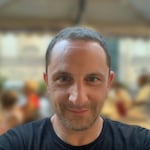If you’re Jewish, there’s something about psychedelics that you might find familiar.

Rabbi Josh Rose is the founder of Co/Lab: Reimagine Jewish.
Courtesy Josh Rose
Rabbi Josh Rose is the founder of Co/Lab: Reimagine Jewish. He says the psychedelic experience and the ancient mystical tradition of the Kabbalah have similar goals.
“The Kabbalah has a lot of contemporary currency among Jews because it’s been an important way for them to deepen their connection to their religious lives,” Rose said. “Psychedelics are known to open up mystical experiences for people and allow people to see the world in new ways.”
As Oregon’s first-in-the-nation legal psilocybin-assisted therapy program comes together, would-be patients may have reservations, perhaps for religious reasons.
Rose said, “If a religious tradition is concerned with human well-being, we have a responsibility to explore the possibilities for well-being and for healing.”
Co/Lab is holding a gathering on viewing psychedelic healing through a Jewish lens this weekend. Rose and OPB “Morning Edition” host Geoff Norcross spoke in advance of the event.
Geoff Norcross: Can you give me a basic understanding of how Judaism and the acceptance of this kind of therapy intersect?
Rabbi Josh Rose: “As more and more people are turning or returning to psychedelics, many people within the Jewish community are trying to see what place it might have. There’s long been a deep and important mystical tradition within Judaism that is often referred to as the Kabbalah. [It] has a lot of contemporary currency among Jews because it’s been an important way for them to deepen their connection to their religious lives. And psychedelics are known to open up mystical experiences for people and allow people to see the world in new ways with a sort of elevated consciousness. And so one of the ways in which Judaism might speak to psychedelics or vice-versa is through people’s understanding of their individual religious or spiritual experiences.”
Norcross: Many authors have made the connection between Judaism and modern psychoanalytic practice. Sigmund Freud was Jewish, after all. Is there something about Judaism that promotes a curiosity about what’s going on in your head?
Rose: “Yeah, I think that part of Jewish religious consciousness is a deep curiosity about the self, and about layers within the self, and what parts of the self are authentic and what parts are an illusion. That’s part of our religious tradition. There is something about Jewish teaching and also about the fact that Jews were a persecuted minority that gave Jews a kind of outsider status that I think gave them an openness to exploring new ideas. And that’s relevant to psychedelics as well.”
Norcross: Many researchers are coming on board with the idea of generational trauma, or trauma that is quite literally passed down through generations. Can psilocybin help?
Rose: “It can help, and it’s also not for everybody. Maybe it’s obvious, but it’s worth repeating that these are decisions that should only be made with a mental health professional. But having said that, the efficacy of psychedelics is just undeniable, based on the research, based on the data. And again, to be clear, it’s not only Jews who bear intergenerational trauma. But it has a distinctive flavor through each individual culture. Many Jews — perhaps they’re children or grandchildren of Holocaust survivors or have dealt with trauma in other ways because of the Jewish story — have found psychedelics to be transformative.”
Norcross: People all over Oregon right now may be thinking about this therapy. And one of the hurdles they may be experiencing is they may feel it runs counter to their upbringing, their religious or their spiritual or even their cultural upbringing. And I’m wondering what your advice is for how they should approach that question.
Rose: “If we’re talking about a person in a religious community, they should seek out their spiritual leader to at least start the conversation. If a hard iron door shuts down there, then what they should do — and perhaps do in any case — is just simply do their own learning, their own research. If a religious tradition is concerned with human well-being, we have a responsibility to explore the possibilities for well-being and for healing. I certainly can’t make a decision for anybody struggling with such questions. But I just think that people need to lead with curiosity and openness and educate themselves.”
Click on the audio player above to hear the whole conversation.
